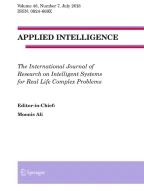Abstract
Multiple-input multiple-output (MIMO) with N Input/ N Output processes are characterized by significant interactions between their inputs and outputs. The control of MIMO processes is usually implemented using sets of single-input single-output (SISO) loop controllers, which requires proper input–output pairing and development of decoupling compensator unit. In this paper, a generalized decoupling technique is proposed. The proposed technique uses relative gain array (RGA) to select proper pairing and particle swarm optimization (PSO) technique to estimate the optimal elements’ values of steady state decoupling compensation matrix constituting the decoupling compensator unit. The proposed technique is applied on 4 Input/ 4 Output two coupled distillation columns process, it proves remarkable success in minimizing the interaction between every input and all outputs except that output has been proper paired with.
Similar content being viewed by others
Explore related subjects
Discover the latest articles, news and stories from top researchers in related subjects.References
Camp PJ, Morari M (1994) Achievable closed-loop properties of systems under decentralized control: conditions involving the steady-state gain. IEEE Transactions on Automatic Control, 39:932–943
Junhong N, Derek L (1998) Multivariable blood pressure control: an application of approximate reasoning. In Fuzzy-Neural Control: Principles, Algorithms and Applications, edited by Prentic-Hall of India, New Delhi, pp 37–67
Bristol EH (1978) Recent results on interaction in multivariable process control. Proc. AIChE 71st Annual Meeting, Miami
Zalkind CS (1967) Practical approach to non-interacting control, Parts I and II, Ins. Cont. Systems, Vol 40, No 3 and No 4
Luyben WL (1970) Distillation decoupling. AIChE Journal 16
O’Reilly, J. (ed) (1987) Multivariable control for industrial applications. IEE Control Engineering Series, Peter Peregrinus, Vol 32
Bristol EH (1966) On a new measure of interaction in multivariable process control. IEEE Transactions on Automatic Control, AC-11, pp 133–134
Kennedy J, Eberhart RC (1995) Particle swarm optimization. Proc. of IEEE International Conference on Neural Networks (ICNN), Perth, Australia, Vol IV, pp 1942–1948
Eberhart RC, Shi Y (2001b) Particle swarm optimization: development, applications and resources. Proc. congress on Evolutionary Computation 2001, IEEE service center, Seoul, Korea, Piscataway, NJ
Kennedy J, Eberhart RC, with Y. Shi, Swarm intelligence (2001) Morgan Kaufmann.
Ying Z, Guangjie Z, Feihong Y (2003) Particle swarm optimization-based approach for optical finite impulse response filter design. Applied Optics 42(8)
Shi Y (2004) Particle swarm optimization,” IEEE Neural Network Society, pp 8–13
Roat SD, Moore CF, Downs JJ (1988) A steady state distillation column control system sensitivity analysis technique. Proceedings IEEE Southeast Con, pp 296–300
Lang L, Gilles ED (1989) Multivariable control of two coupled distillation columns for multicompenent separation on a pilot scale. IFAC Proc. Symposium DYCORD +’89, pp 85–92
Newton GC, Gould LA, Kaiser JF (1957) Analytical design of linear feedback controls. John Wiley and Sons Inc., New York
Author information
Authors and Affiliations
Rights and permissions
About this article
Cite this article
El-Garhy, A.M., El-Shimy, M.E. Development of decoupling scheme for high order MIMO process based on PSO technique. Appl Intell 26, 217–229 (2007). https://doi.org/10.1007/s10489-006-0015-1
Published:
Issue Date:
DOI: https://doi.org/10.1007/s10489-006-0015-1
